Graham Reid | | 11 min read

Paul Simon calls from New York 15 minutes early, polite and apologetic. He needs to put the kids to bed -- his three children aged 7, 5 and 2 with his third wife, 34-year-old singer-songwriter Edie Brickell -- and read them stories. Could he call back in maybe an hour and a quarter?
And, as you might expect from the man's almost obsessive, meticulously crafted music, punctually 75 minutes later he does.
Simon's songs have imprinted themselves on the collective memory of generations, from The Sound of Silence and I Am A Rock as half of Simon and Garfunkel over 30 years ago -- and about which he now understandably can't be bothered talking -- through to the seminal Graceland album and its touring Afropop juggernaut.
Phrases from his lyrics have entered the lexicon of contemporary language. He brought the township jive of South Africa and percussive sounds of South America into the vocabulary of popular music through the Graceland and Rhythm of the Saints albums, and he has articulated the aspirations and alienation of his peers.
And here he is back on the line, the kids in bed, a new album out and a birthday to be congratulated on. Surprisingly, Simon who is imprinted in the memory as a youthful "poet and one-man band" is now 59, which allows you to say "Man, you're old."
He laughs -- an uncommon punctuation in this free-ranging and friendly, if earnest, conversation -- at the reference to Old from his new album You're the One: "My birthday's here, and all my friends stand up and cheer, and say, "Man, you're old, getting old'." 
You're the One is a low-key Simon song collection more akin to early-70s albums such as Still Crazy After All These Years than the musically ambitious Graceland and Saints or to his last, much unloved, The Capeman project of two years ago.
The Capeman, an album then Broadway production derided by critics and public alike, was a case of ambition outstripping ability.
Based on the life of Salvador Agron, a 16-year-old New York gang member sentenced to death after stabbing two teenagers in 1959, The Capeman preoccupied Simon for seven years. He co-wrote the script with Nobel prize-winning novelist Derek Walcott but the theatre production was troubled from the start. The opening was delayed, there were three changes of director, and the show underwent a revamp just before its launch in January '98.
Critics were withering -- one said seeing the show was like watching a "mortally wounded animal" -- and it closed after 68 performances. The $US11 million production went down as one of Broadway's biggest flops. 
Simon is guarded about what he learned by the experience. He speaks highly of the collaborative process, the friends made and being in touch with the Latin music scene in New York.
"It was a privilege on that level. On the other it was bruising and that's not your favourite thing to happen. That reverberates for a long time, but your first reaction is not what you think a year later."
It has been suggested that after the show closed he withdrew.
"Here's the frustration," he says tensely. "When you get your information from the media, it's not right. The play closed in the early spring, a month [later] my son was born. It wasn't withdrawal, it was parenting. By the following fall I began to work on finding this band [for You're the One] so the withdrawal, if the implication is that I withdrew in a wounded way, is not true at all.
"I went into life instead of art and then in due course, as it usually does, some artistic impulse grabbed me and I went back to work to find out what that was."
Perhaps it's the late hour, possibly it's his age, maybe the question about what was a brutal fall from grace, but Simon sounds weary. His speech is slow, remarkably so for a New Yorker, and there are numerous pauses during the 50-minute conversation.
But he is comfortable with You're the One, its modesty perhaps a result of The Capeman experience (some lyrics could be interpreted as rejoinders to his critics) and he says where songs on Graceland took months to write, nine of the 11 came within a day or two.
"The sounds are basically guitar instrumental duets, which I composed first, and the songs were written over them. The songs are basically stories, so structurally it was clear to me early on. That's just a function of practice and having done it for . . . many years."?
He enjoys the discreet punchline. Yes, it has been a very long time to be a singer-songwriter.
"Yeah, it's a decision I made at 13 or 14 that this was what I wanted to do. Periodically I revisit that premise because it's a premise a 13-year-old made up: 'You really want to do that? You decided this at 13 and that's going to be it?' But I keep arriving at the same position. I really do want to do this."
There is a consistent theme in Simon's conversation, whether the subject be music, the lyrics on the new album or American politics. It's one he concedes has been born of age and experience: "It's not that there are no certainties, I think there are. It's just that the certainties contain their opposite. You become aware opposites coexist all the time and are equally true."
Songs on You're the One address this insight. The title track says, "You're the one that broke my heart ... but when I hear it from the other side, it's a completely different song ... and I'm the one who broke your heart."
He sees this simultaneous existence of opposite but equal truths in politics. As a longstanding Democrat who played a fundraiser for presidential hopeful Al Gore, he bemoans "the emphasis on polls and the degree to which each candidate shifts and manipulates after reading them."
Yet even here reads the dichotomy: because politicians conform to what polls tell them the people want "in a funny way it really is democracy, the game to offend no one and appeal to the largest possible number of people."
And does this astute blandness have parallels in popular culture where pop music is marketed to the lowest common denominator?
"Sure, selling has been refined into an art. Art is unimportant because packaging is the art. That's the way it is if you look at the charts. But in another sense, which is equally as real, there is an enormous amount of music which has nothing to do with the pop charts and is having a profound effect on, possibly, a smaller audience, but an audience likely to be the next generation of artists and thinkers.
"That's happening simultaneously within the mass culture and my instinct is it's just as powerful a force. Popular culture is incredibly powerful and I don't have any problem with that. It's absolutely fine and that's what is usually happening in the world, opposite poles are occurring simultaneously."
Where once he said he assumed no fans, today he revises that position.
"I've had several pieces of work which could be called commercial flops, so I know what that is and I know the consequences. And they are not so terrible as everyone imagines. The audience shrinks somewhat but there's a significant group of people who are along for my ride and are just as interested in The Capeman as they are in Graceland.
"I'm proud of this album and would expect it will find an audience. I don't say, 'I don't care if people understand me or not.' I really do care. I'm trying to be clearer as I get older and for it to be more enjoyable for people, even if that group is smaller.
"Even if it doesn't get into the millions and is only in the hundreds of thousands, it's a lot to be talking to. In terms of how that affects my work? It doesn't at all. That group may have expanded when I had really big hits, but maybe that will never happen again. I don't know."
Early returns for You're the One confirm his audience is shrinking.
The album entered the US charts at 19 then dropped to 30. It hasn't charted in the top 50 in New Zealand, which suggests that the Paul Simon generation may not require his services and articulation as it once did, despite him applying the craftsmanship he has always.
And contrary to expectation from a man whose lyrics have had such resonance, Simon says from Graceland onward, and perhaps even before, he has always written the music first.
"You look for a sound or a rhythm which moves you in a way you like and when that happens you begin to speak your mind in the lyrics. It's an emotional way of working.
"It may sound strange because some people would describe me as intellectual, but it's not like that. It's way more about emotion." 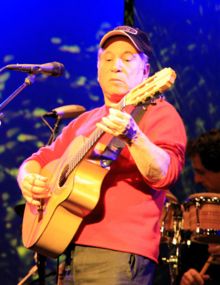
Tellingly he says his lyrics - which are prompted by the sound of the music rather than emerging from a notebook - can be a mystery to him.
But the final track on the album, Quiet, will doubtless lead to questions and interpretations.
Simon sings, "I am heading for a time of quiet when my restlessness is past, and I can lie down on my blanket and release my fists at last."
"I'm not aware of anything prompting me. I'm constantly surprised at what comes out of this whole album.
"I was surprised at the point of Old. It starts as some kind of recognition, the guitars and drums sound like Buddy Holly, so you talk about Buddy and growing older and the next thing you know you are talking about the universe.
"As far as Quiet is concerned I thought afterwards, 'Is that true? Is that where you are going? You said it, maybe that is where you are going. Maybe you are going to finally get some quiet, or maybe you are going to die.'
"It means one of those things, you either relax - or you are really going to relax!"
And Paul Simon, 59 years old, offers another rare laugh.
"Whatever. In my belief system [death] is just a continuation, a deep, deep peace in some other plane."
Favourite tracks from Paul Simon's back catalogue:
The Sound of Silence: because of the line "and the words of the prophets are written on the subway walls." And this waaay before tagging.
Mrs Robinson: because of the line "where have you gone Joe DiMaggio, a nation turns its lonely eyes to you." And of course the film starred the seductive Anne Bancroft.
The Boxer: because it's a good song and very, very long. And some people interpreted the "lie la lie, lie la lie" coda as another Simon swipe at Bob Dylan. People interpreted songs back then.
American Tune: because is there anyone who could sing, "I don't know a dream that's not been shattered, or driven to its knees" and not feel every word to be true? Oh, and the lovely tune is based on a section of Bach's St Matthew's Passion. Plus, he sang it at Jimmy Carter's Inaugural Ball in '77.
Slip Slidin' Away: because of the verse about the housebound wife who says, "a good day ain't got no rain, a bad day I lie in bed and think of things that might have been." Fay Weldon couldn't have put it more concisely.
Rene and Georgette Magritte with their Dog After the War: because it's a lovely wee song and they don't write titles like that any more.
Gone at Last: because Phoebe Snow, by his own admission, sings him off the record.
The Boy in the Bubble: because Simon encapsulated the fear, uncertainty and madness of the late-20th century in the lines, "the bomb in the baby carriage is wired to explode, these are the days of miracle and wonder/days of lasers in the jungle ... "
You Can Call Me Al: because it showed that this guy, who is a friend of Chevy Chase and Steve Martin, really did have a sense of humour.
Graceland: because it's true, we all will be received in Graceland.

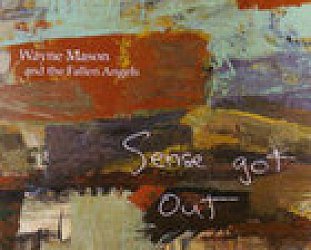

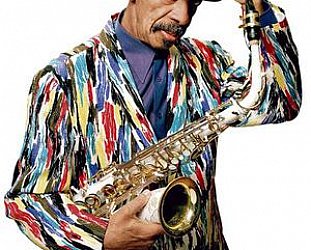

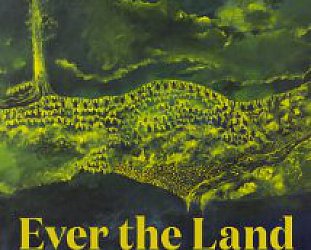
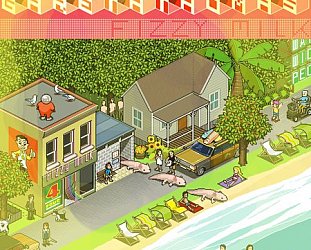
post a comment